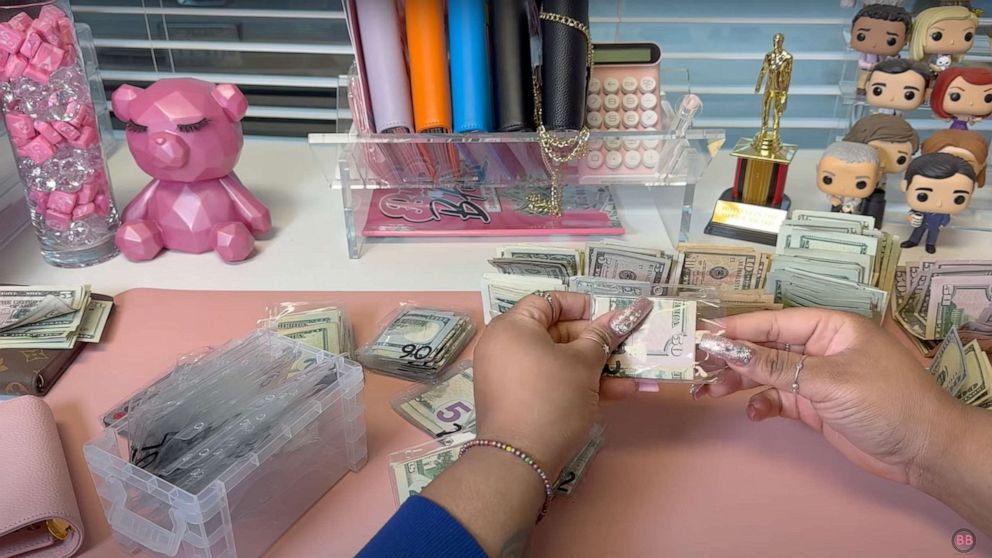


Jasmine Taylor has perfected the art of cash stuffing.
Taylor, a TikToker who shares her budgeting journey with her followers on the social media platform, said she “went from swiping a credit card and not really understanding where my money was going” to “having to tangibly handle the cash” using the cash stuffing method.
“It was life-changing for me,” Taylor told “Good Morning America.”
MORE: 'Cash stuffing' for the holidays? Here's how to do itTaylor said that she embarked on her cash-stuffing journey in January 2021 when she had a little over $60,000 in student loan debt, around $9,000-$10,000 in credit card debt and $8,000 in medical debt.
Taylor, who was turning 30 at the time, said she was struggling, “not managing my money,” and “just needed to take accountability for my previous financial mistakes.”
She started by looking at what she had, taking a look at her debt and income and then researching budgeting styles. She weeded through the ones that she already tried and didn’t have success with and then finally settled on cash stuffing, which allowed her to honestly evaluate where her finances and debt stood.
“When you’re in debt and you have financial issues, you kind of hide it sometimes,” Taylor said. “I really made it a point to go in and just take a look at what [it] was so that I could make a plan going forward.”
When she assessed how her money was being spent, Taylor said she was “shocked” to find she was impulsively spending money.
“When you add it all up at the end of the month, it’s four or five hundred dollars, and I’m wondering why I’m struggling to pay certain bills or struggling to make it to the next check,” she said. “And there’s this money that’s unaccounted for that I was wasting frivolously, impulsively spending.”
MORE: These #BudgetTok strategies could help you save extra cash each monthTaylor breaks the concept of cash stuffing down as “taking your normal budget if you have one, and just implementing it with cash.”
She said that you start with a budget, divide it into categories using envelopes, then pull cash from the bank to stuff the allotted amount of money into each envelope or category. Those categories can be for anything like groceries, bills, utilities and more.
Personal finance author Rachel Cruze also explained to “GMA” that the cash stuffing method begins with a budget.
“Say, hey, here’s my income for the month, minus all of my expenses, including giving and saving,” she said. “And this is what I have to work with. And when you tell your money what to do, which is a budget, it gives you a level of freedom.”
“One great thing about budgeting and cash stuffing is, it gives you the ability to make choices before you go and make a purchase,” Cruze added. “It just brings this level of intentionality.”
The cash stuffing method was popular among TikTokers like Taylor around the holidays.
“Most people have a Christmas sinking fund,” Taylor explained. “You start your Christmas sinking fund in January. If you add $20-$21 a week, you’ll come out at around $1,100 at Christmas time. You have the Christmas money saved up in an envelope and you can just go shop without it affecting your day to day.”
MORE: 'Budget mom' shares tips to pay down your debt in 2022Today, Taylor continues to use the cash stuffing method for budgeting and also shares how she does it on her social media pages, including TikTok and YouTube, where she’s known as “Baddies and Budgets.”
She said she started sharing her journey on social media to keep herself accountable.
Taylor also turned her budgeting advice into a business by selling her own cash-stuffing envelopes and related items online. She said she used a stimulus check to invest in her business, which she launched on her 30th birthday in April 2021.
“I started out making my own items for my own budget and more people were just interested in asking where can I get these things,” she said. “I bought a Cricut, I bought some inventory, hosted my Shopify site and I just started.”
Through her experience, she said the biggest lesson she’s learned is to not rush the process.
“When I was paying off student loan debt, I felt like I needed to get it paid off now, I needed to throw every single dollar at it, and you didn’t get the debt overnight,” she said. “So it’s OK, if it takes more than a little bit of time to get it paid off.”
“It’s more about building the financial muscle, learning the consistency to consistently make debt payments, pay on time, pay extra,” she added.
Taylor said she paid off her credit card debt in the summer of 2021 using the cash stuffing method. She also said she paid off $26,000 in student loan debt in 2022.